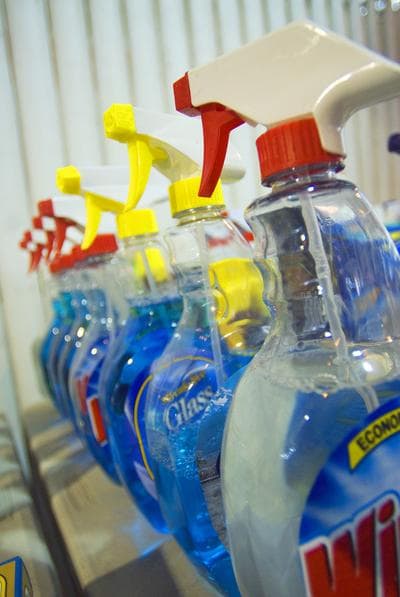Advertisement
When You Can't Trust The Labels

By Dr. Ellen Kornmehl
Guest Blogger
We try to be informed consumers, pouring over ingredient labels and shying away from products that may be deleterious to health. But how reliable are those ingredient lists and promising claims of “safe” and “non-toxic?” As it turns out, not very reliable at all. A new study testing everyday household commercial items for chemicals linked to breast health, growth, and asthma shows that conventional products, as well as “safe, green” alternatives, contained 55 potentially harmful chemicals. The agents tested were hormone-or endocrine-disrupting compounds, with potential links to breast cancer, male infertility, and abnormal development, as well as chemicals associated with asthma.
Published in Environmental Health Perspectives by the Silent Spring Institute, a national research agency in Newton, MA, the study is the largest commercial product-testing survey of its kind. Products tested (see list here) included shampoos, sunscreens, cleaning agents, bedding, hand soap, laundry detergents, lipstick among 50 product types. The highest levels of phthalates, DEHP, DEP, BBP, used to soften plastics and regarded as relatively strong hormone disruptors, were present in vinyl household products, such as pillow protectors and shower curtains. Sunscreens and fragranced products — including air fresheners, dryer sheets, and perfume — had the largest number of target chemicals and some of the highest concentrations.
Phthalates are linked to concerns about children’s growth and development as well as reproduction and have been banned in children’s products in the EU since 2005 and regulated in the US since August 2008.
Lesser known phthalates known to act as weaker hormone or endocrine disruptors, were found in personal products, including commercial “safe” alternative products. This finding raises a manufacturing substitution effect to avoid reporting. Another chemical, triclosan, known to act as a hormone disruptor was widely present in soaps and cleaning products, used primarily as an antimicrobial agent.
The link between these endocrine disruptors and breast cancer and whether reduced usage can impact breast cancer prevalence is a focus of environmental toxicology research at the Silent Spring Institute. In addition, biomonitoring studies have previously shown these surveyed chemicals to be present in people’s bodies and dust and air samples taken from households.
“Right now, we have a patchwork of out-dated rules for what can go into consumer products,” says Julia Brody, an environmental epidemiologist and Executive Director of the Silent Spring Institute. “Companies don't have to list all a product's ingredients on the label, and many of them don't. Our study detected numerous chemicals that were not on the product label.”
In many tested products in which disruptors and asthma promoters were detected, labels on alternative as well as conventional products were incomplete and did not report the ingredient. The finding that consumers cannot rely on product ingredient lists entirely highlights loopholes that may allow manufacturers to substitute unregulated agents for those that concern consumers and health policymakers. More concerning, trace levels for surveyed chemicals were found in products that manufacturers regarded as “compound-free” raising the specter of “dirty” chemicals or post-production contamination through sourcing and packaging. These findings make a case for the need for modernization of labeling and third party testing requirements for manufacturers.
In the meantime, “Consumers can reduce their own exposure to some extent by using fewer products and reading labels,” says Brody. Silent Spring Institute’s website today recommended, “Exercising caution with products applied directly to the skin and products used indoors, where chemicals accumulate in the air and dust.” In addition, consumers should weigh carefully reduced use of vinyl products and products containing fragrances and anti-bacterials (triclosan and triclocarban).
Ellen Kornmehl is a Radiation Oncologist affiliated with the Massachusetts General Hospital and the Gillette Center for Breast Cancer, and has a longstanding interest in women's cancer care and prevention and environmental health. She is on the board of "Friends of Silent Spring."
This program aired on March 14, 2012. The audio for this program is not available.
